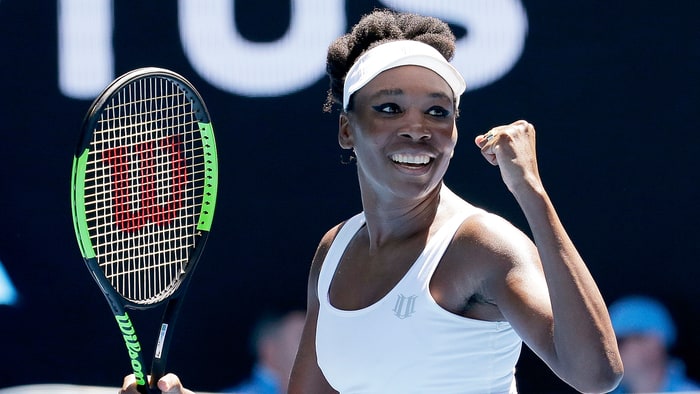
There’s one title Venus Williams cherishes more than all others.
It’s not the one you might think.
“Role model, definitely,” Williams told USA TODAY Sports. “Tennis is limited. … Being a role model transcends.”
Seven Grand Slam titles, the Olympic gold medal and world No. 1 – she’s done it all in a career that has stretched into its third decade. The power and athleticism with which she and sister Serena play transformed the game.
Yet for all of that, Venus Williams’ greatest impact has come off the court. There is equal prize money at Wimbledon largely because of her. She was the driving force in the WTA’s partnership with UNESCO that promotes gender equality. She is a financial backer of Ellevest, an online investment platform geared toward women.
She is part of Brawny’s new Strength Has No Gender campaign, which is recognizing trailblazing women in honor of Women’s History Month and International Women’s Day. She’s also championing equality through The Players’ Tribune “Stand Up” series.
“My sense is, over time, she will have a place in the history books in terms of equality for women and the role that athletes can play to effect social and political change in the world,” said Larry Scott, who was chairman and CEO of the WTA from 2003-09 and is now the Pac-12 commissioner.
“I had the chance to meet Arthur Ashe and be part of the work he did fighting apartheid in South Africa,” Scott added. “Then getting to know Billie Jean King and seeing the impact she’s had beyond her sport as a social activist and entrepreneur and pioneer.
“I think Venus has the opportunity to go down in history as an athlete of that ilk, who had an impact beyond their sport.”
Williams gives a self-conscious laugh when she hears this. Unlike her little sister, who commands the spotlight as if she owns it, Venus Williams has never been comfortable with the spectacle that comes with being a star athlete.
But her quiet and calm, almost regal, demeanor masks a fierce passion to stand for what is right.
“We should all speak up when you have the opportunity to be part of something bigger than yourself and when it’s something that’s not right,” Williams said, simply.
That’s easier said than done, though. Especially for a 20-something at the height of her career.
The U.S. Open has had equal prize money for men and women since the early 1970s, thanks to King’s threat of a boycott. But the other Grand Slams continued to pay male champions more for another 30 years, a disparity that rankled the female players.
When Scott raised the issue when he arrived at the WTA, he found one of his staunchest supporters in Williams. It was not the money itself – Williams had signed what was then a record five-year, $40 million endorsement deal with Reebok in 2000 – but the message it sent to women.
All women.
“Look at the rest of society,” Scott said. “You look at corporate America, and women executives don’t have 90% of the CEO positions and they probably don’t have 90% of the (pay).”
At a meeting the day before the women’s final at Wimbledon in 2005, Williams made an emotional appeal to the chairs of all four Grand Slams. Asking them to close their eyes, she told them to imagine themselves as a young girl who worked just as hard, sacrificed just as much and dreamed just as big as any boy, only to be told when she reached the pinnacle that, “you’re almost as good, but not quite the same.”
“She, on a very emotional and powerful level, connected,” Scott said. “I really felt if we were going to get over the line, it was coming out of this meeting.”
But Wimbledon refused to budge. So before the 2006 tournament, Williams wrote a simple yet strongly stated op-ed for The Times of London, a piece that caught the attention of members of Parliament and then-Prime Minister Tony Blair.
Beginning with the 2007 tournament, Wimbledon paid its men’s and women’s champions equal prize money.
“I did dream big in my own way and people (today) can dream even bigger. Knowing there are no limits, no boundaries,” Williams said. “I personally believe in no limits at all. If there’s one thing I believe in at all, it’s don’t accept limits.”
She’s bringing that attitude to her work with Brawny. In addition to commemorative packaging that rebrands the iconic lumberjack as a female, the campaign features videos of women who have broken barriers in traditionally male-dominated fields.
“I find these women empowering,” Williams said. “It’s motivating, it’s exciting. It gives you reason to get up and do more.
“You can be anything you want to be, as a male or female. That’s what this message is.”
It’s what her message is, as well. And it will resonate long after she’s done playing.
By Nancy Armour
This article was republished with permission from the original author and 2015 Ronald Reagan Media Award recipient, Nancy Armour, and the original publisher, USA Today. Follow columnist Nancy Armour on Twitter @nrarmour.